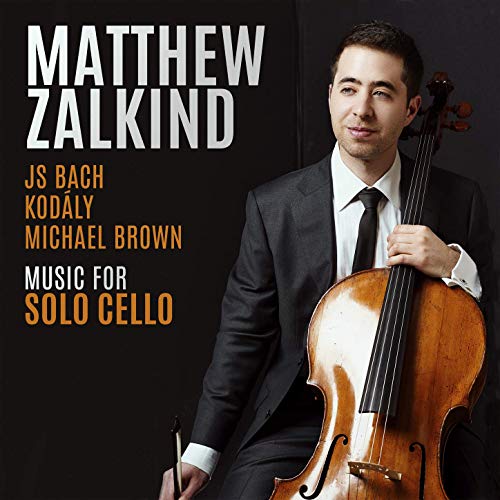Matthew Zalkind: Music for Solo Cello
View record and artist detailsRecord and Artist Details
Composer or Director: Zoltán Kodály, Michael Brown, Johann Sebastian Bach
Genre:
Instrumental
Label: Avie
Magazine Review Date: 10/2019
Media Format: CD or Download
Media Runtime: 76
Mastering:
DDD
Catalogue Number: AV2406

Tracks:
| Composition | Artist Credit |
|---|---|
| (6) Suites (Sonatas) for Cello, Movement: No. 6 in D, BWV1012 |
Johann Sebastian Bach, Composer
Johann Sebastian Bach, Composer Matthew Zalkind, Cello |
| Suite for Solo Cello |
Michael Brown, Composer
Matthew Zalkind, Cello Michael Brown, Composer |
| Sonata for Solo Cello |
Zoltán Kodály, Composer
Matthew Zalkind, Cello Zoltán Kodály, Composer |
Author: Andrew Farach-Colton
In Kodály’s sprawling Sonata, Zalkind’s fevour isn’t as incendiary as, say, Bengtsson (Danacord) or Weilerstein (Decca, 1/15). He takes his time in the opening Allegro maestoso ma appassionato, really taking the maestoso directive to heart. Indeed, there’s an epic quality to Zalkind’s reading, and his plaintive tone in high-lying lyrical passages has an almost keening quality that carries an unexpected whiff of tragedy. The Adagio, too, is conceived on a grand scale, starting with a fearsome, slow crescendo. He seems to think of phrasing in terms of gestures that make both rhetorical and dramatic sense, and in the finale this thoughtfulness is evident in the way he picks up and carries melodic threads through the music’s intricate fabric.
Michael Brown’s Bach-inspired Suite sounds a little flimsy placed between these two masterworks but works well enough as an interlude. The second movement, an ‘Improvisational Sarabande’, uses repetition on both a large and small scale to create a clever house of mirrors, but it’s the herky-jerky energy of the final Gigue that satisfies most. Zalkind plays it with conviction. All in all, this is a most auspicious debut.
Discover the world's largest classical music catalogue with Presto Music.

Gramophone Digital Club
- Digital Edition
- Digital Archive
- Reviews Database
- Full website access
From £8.75 / month
Subscribe
Gramophone Full Club
- Print Edition
- Digital Edition
- Digital Archive
- Reviews Database
- Full website access
From £11.00 / month
Subscribe
If you are a library, university or other organisation that would be interested in an institutional subscription to Gramophone please click here for further information.




